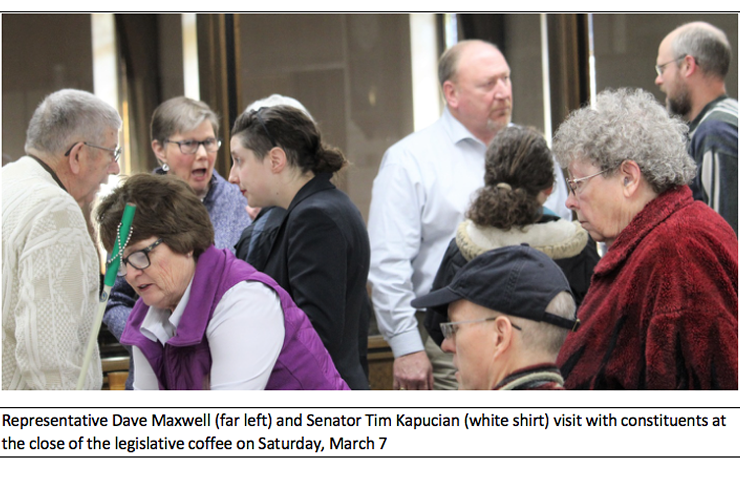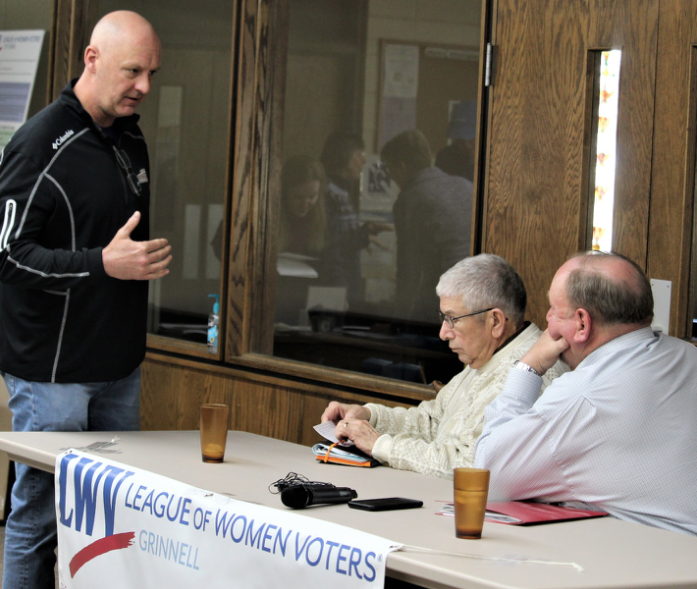
By Michael McAllister
Representative Dave Maxwell and Senator Tim Kapucian faced tough, broad questions during the second legislative coffee of the 2020 session, held Saturday, March 7, at Grinnell’s First Presbyterian Church and sponsored by the Grinnell Area Chamber of Commerce and the League of Women Voters.
The questions reflected Grinnell-area residents’ concerns regarding local, state, federal, and international issues. Approximately 40 people attended.
The hour-long session conformed to established format: opening remarks by both legislators followed by questions from attendees. The League continued the practice, introduced last month, of asking questioners to write their queries on note cards.
Opening Remarks
“Things are moving fine,” said Senator Kapucian, to characterize progress during the current session. While the legislature did not meet its self-imposed deadline for submission of a school budget (within 30 days of the Governor’s State of the State Address), a budget has now been completed calling for an increase of $300 million over 2017 levels.
The Senate raised the age for the purchase of tobacco and vaping products to 21. Kapucian called this measure “driven by the federal government” in part.
The Senate also passed qualifications for the restoration of voting rights to felons should that measure become adopted as an amendment to the state constitution. (This issue was addressed further following a question from an audience member.)
Two measures under consideration by the Senate Transportation Committee, which Kapucian chairs, affect individual driving licenses. Presently, people over the age of 72 are restricted to two-year license renewals. One measure would raise that age to 78. In addition, Kapucian hopes to add an amendment that will add a designation of “autistic” to an individual’s license when appropriate, in the same way that some licenses carry notices of “hearing impaired” now. Kapucian feels that such a designation could prevent confusion should a person with autism be pulled over by a law enforcement officer.
During his opening remarks, Representative Maxwell explained that “the Senate and the House are running on different schedules this year.”
He said “the big issue of the week” was the education bill. Passage was difficult because there is often disagreement between even members of the same party, Maxwell explained.
One issue that garnered strong support, however, was a measure dealing with animal cruelty passed by the House. Maxwell did not detail the specifics of the bill but remarked that it had gone to the Senate and would need to be reconciled; thus the exact nature of the bill, should it go to the Governor’s desk, is unknown presently.
Some bills, Maxwell went on to explain, are relatively simple—“one-page bills.” The House had considered “about 80 bills or more” during the previous week.
Their opening remarks completed, the legislators took written questions, read by LWV President Terese Grant, from the audience. The questions are paraphrased in the balance of this report.
Why is victim compensation required to restore felon voting rights?
Addressing an issue that Governor Kim Reynolds has called a priority, Senator Kapucian outlined a Senate bill that would impose some restrictions on a state constitutional amendment to restore voting rights to felons once they have completed their sentences should that amendment be approved. Restrictions would have to do with payment of restitution if such conditions were part of the original sentence. In addition, felons convicted of certain serious crimes such as murder would not find rights restored automatically but would need to petition the governor.
Kapucian stressed that restrictions are still being negotiated, but the driving force behind the measure is a concern for victim rights.
Will the legislature find funding for children’s mental health?
The legislature continues to consider proposals tied to the Invest in Iowa Act, Senator Kapucian noted, and he expressed confidence that children’s mental health services would be funded once details of the investment act are worked out. Likewise, Representative Maxwell seemed certain that funding would result but acknowledged that finding money is always the rub.
What can be done to maintain ambulance service and emergency medical care in rural areas such as Poweshiek County?
Both legislators spoke favorably of a bill in progress that would designate emergency medical services as essential, an at that would in turn allow county supervisors to levy taxes to pay for such services if necessary.
If the Supreme Court finds the Affordable Health Care Act unconstitutional, what is the future of health care in Iowa?
Representative Maxwell called the question “a little above our pay grade.” Discussion led to consideration of a popular provision of the AHCA, the requirement that pre-existing conditions be covered by insurance companies. Both legislators felt that this principle is strong enough that it would not be abandoned.
Senator Kapucian cited steps the legislature is taking to keep health care sustainable at the state level, such as measures to find and eliminate fraud so that “we can keep that money for the people that really need it,” although he acknowledged that any savings resulting from such measures would not significantly offset costs of people eliminated from Medicaid eligibility should the AHCA be eliminated. He expressed the opinion that the federal government would need to assist states with the costs of Medicaid administration if the scenario suggested by the question were to happen.
The issue, he concluded, calls for “a lot of soul searching” on the part of policymakers.
Grinnell Chief of Police Dennis Reilly visits with Representative Maxwell and Senator Kapucian.
Is the school lunch program included in the agriculture department budget? How much goes to SNAP? How do people qualify to participate?
Neither legislator provided a thorough response to these broad questions since many of the provision come from the federal level.
What happens if the coronavirus comes to Iowa? Are test kits available?
No, according to Dave Maxwell, test kits are not thoroughly available. The good news, he added, is that the weather is warming. Senator Kapucian concurred. “The virus does die at a higher temperature,” he said. He added that schools are restricting student travel and cautioned people to see their doctor if ill.
Both lawmakers stressed individual precautions such as limiting travel, and they praised the quality of health care institutions in Iowa.
The privatization of Medicaid “has been a disaster.” Governor Reynolds has called for even more money to support the program this year. How can you support the program?
“Because that’s the way it was,” Representative Maxwell quickly responded, meaning that the state-run program was also costly. He stated further, however, that privatization “has not been very good from the very beginning.” Current issues involve reimbursement. “Companies are not passing money through like they need to be doing,” he noted.
Senator Kapucian asserted it is difficult to assess the fiscal status of the program since we do not know where the state would stand fiscally had the state-run system remained in place. The “apples to oranges” metaphor was part of his response.
He acknowledged that provider reimbursement is not ideal, citing minor bureaucratic snafus—not filling out a form correctly, for example—as complicating payments to providers.
Improvements to the system are underway, he stated, adding that phasing in the program might have made for a smoother transition.
He spoke highly of the new DHS director, Kelly Garcia, appointed by Governor Reynolds as of November 1, 2019. Kapucian said she has earned favorable comments “from the other side of the aisle.”
Can you comment on legislation designed to prevent out-of-state investors from buying mobile home parks and raising rents prohibitively on tenants?
“ I know it’s a problem,” Senator Kapucian responded. “We need to protect these people,” meaning the residents of mobile home parks whose homes, though called mobile, aren’t. The Iowa Senate did not pursue legislation, however, due to concerns about rent control issues.
Kapucian supported restrictive legislation, but it “lost its legs.”
“I’d like to ban out-of-state people from buying them [mobile home parks], but I think that would go against antitrust laws,” he added.
In the House, Maxwell reported that legislation failed to get out of committee. He also cited rent control issues as the block.
He concluded, however, by saying that some representatives are still working on the issue.
If property owners are permitted to refuse housing vouchers, won’t homelessness in the state increase, and what can the legislature do to address homelessness?
This question prompted general observations on the topic of homelessness and the problem’s close ties to mental health. Maxwell referred to the de-institutionalization of people with mental health issues that began in the 1960s as one of the sources of the problem.
Kapucian mentioned personal experience with a building in which a rental unit is not well maintained. He called it “party central” and referenced broken glass in the hallway and similar issues. This is the type of problem that legislation is intended to address.
He added that homelessness results from a combination of factors and that many people affected are veterans. While he has no simple answers, he sees attention directed toward the problem as a positive sign.
What are you doing to combat climate change?
Both lawmakers cited improved farming practices and conservation techniques that, at least indirectly, promote better soil, water, and air quality. As examples, he mentioned bumper strips, cover crops, bioreactors, tiling and drainage innovations, and improved farm equipment such as tractor exhaust systems that expel air that is cleaner than the original air taken in.
Kapucian also believes that wind and solar power—especially solar—can mitigate environmental impact. He stressed that all means of energy innovation should be explored, adding, “I’ve always believed in ‘all of the above’ when it comes to energy alternatives.”
Maxwell also lauded conservation techniques such as no-till. “Things have changed a lot,” he said, from the days when it took “five trips over [a field] to get the corn in.”
[Directed to Senator Kapucian]: If your license plate is approved, what will it look like?
This question refers to a proposal by Kapucian to issue a license plate that bears the slogan “The corn state.” The idea for the plate came about because, first, Kapucian, who chairs the Senate Transportation Committee, was astounded at the success of the “black out” plate, citing $4 million in the road use fund as a result of its issue; second, a visit to a friend’s machine shed, where a license plate collection is on display, drew his attention to the slogan, which once adorned Iowa’s plates.
Kapucian told Radio Iowa in February that, if the plate is approved, the slogan “The corn state” will appear at the top of the black-and-white plate, and “some type of an ear of corn” will appear behind the plate’s lettering.
Kapucian feels the license plate will be popular with farmers and that it will help promote state identification throughout the country, but there are several steps in the process before a proposal can become a plate.
In closing the session, Terese Grant emphasized that constituents should feel free to contact their representatives by letter, telephone, or email. Both Representative Maxwell and Senator Kapucian are responsive to comments and inquiries.
The final legislative coffee of the session will be held on Saturday, April 4.






